Q&A with David Thompson
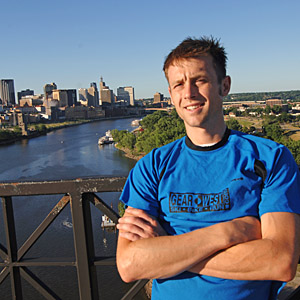
St. Paul, Minnesota’s David Thompson has the fastest bike split at the big money Life Time Fitness Triathlon in Minneapolis. That's faster than Hall of Fame-level ITU competitors Craig Walton, Matt Reed, Simon Lessing, Craig Alexander, Greg Bennett, Hunter Kemper – you name it. But unlike other one split wonders, the man with a degree in nuclear engineering from MIT also worked hard on his swim and run to become a genuine all-around threat at the Olympic and half Ironman distances.
With three wins at the Spirit of Racine half Ironman, two wins at the Olympic distance Philadelphia Triathlon, dominating wins at both of the Tri 101 three-quarters of an Ironman distance races against tough fields in 2007, a win at the Boulder 5430 long course, a highly competitive fourth at Escape From Alcatraz, and three straight USA Triathlon long course duathlon Nationals titles, Thompson had dreams of even better things. But after a sub-par day at the Minneapolis Life Time Fitness and a struggling third at Racine, doctors discovered an inguinal hernia that sidetracked the 31-year-old Minnesotan for the rest of 2008. After an operation and slow recovery, Thompson thinks he is back on track for a shot at the podium at the Ironman 70.3 World Championship.
Slowtwitch: When did the hernia hit you?
David Thompson: In early July I started to get into prime form. I had just won my second straight Philadelphia Olympic distance race and dueled with Craig Alexander on the run at Escape from Alcatraz before finishing fourth. But then I felt tired and had a bad race at Life Time Fitness. I did not feel right.
ST: How hard was it to diagnose?
David: In Racine I started to have cramping. I thought I was dehydrated. I had the lead until mile 10 of the run and then Luke Bell passed me and then Joe Gambles. It was tough. I finished in a run and a walk. Daniel Bretscher was closing in but I held him off and hung on for third. The race was the third week in July. I didn’t have the classical hernia symptoms that become obvious with ab crunches. I probably exacerbated it by continuing to train and race. My chiropractor could not find it at first, but the doctor at Racine found a bulge and my chiropractor told me if it’s not getting better it’s gotta be a hernia.
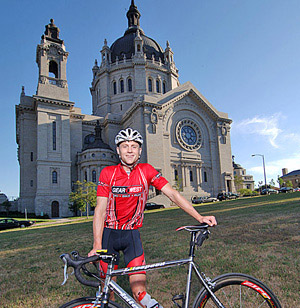
ST: Did the injury affect your swim as well as your bike and run?
David: Yes. It was a frustrating thing. With the hernia injury, it was so bad I could not kick or do flip turns or push off the wall. I had to swim straight with pull buoys. With the knee injury I had to put swimming on hold until a month or so before Clearwater.
ST: You were severely disappointed with your drafting penalty which cost you a shot at success at Clearwater in 2007. I know you wanted to come back and show what you could do the next year, but why did you race at Clearwater in 2008 despite all injuries?
David:Before I had my scheduled surgery on December 30, I decided to go down to Clearwater for Ironman 70.3 Worlds. I just wanted to go down and ride. I had done nothing since July. It was fun to go and race in the sunshine. I knew my run would be awful, but I could still go hard on the ride.
ST: What was the operation and immediate recovery like?
David: When they operated in my hernia, they put a Gore-Tex mesh on both sides of the hernia. They put a little mesh in there and there is a channel between one mesh panel on the outside and another on the inside. The operation took two hours or so, and it still hurt afterwards. I was all right until the pain pills wore off. By the time we got back to the house Hannah dragged me back to house. I was in extreme pain for about 3 weeks afterwards. Sitting up was my exercise. Doctors said the mesh feels better as it grows together after the stitches are pulled out.
ST: I’ve heard complications with your knee?
David:Part of my trouble this year stemmed from an interaction between the hernia injury and subsequent knee problems that surf aced after the surgery. The hernia was causing my adductor to tighten inside of my right leg and that pulled the kneecap over to the right and my kneecap then was wearing down the cartilage. The doctor’s theory was that the hernia was cramping to hold the knee in place.
ST: So you had knee pain at California Ironman 70.3 where you could only manage to come off the bike 12th. Was that related to the hernia?
David:At Oceanside, I got knee pain again, but the doctor looked at it and said it was not caused by the hernia-adductor connection. It was patellar tendinitis, and he said that was good news. If it had been chondromylacia, he said I probably would have had to retire.
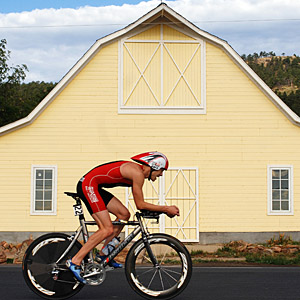
ST: So were you a little afraid that things might go bad at Powerman Alabama just a short time after your problems at Oceanside?
David:I was a little leery there about making two 8km runs at Powerman. I wore a brace for it. After I ran well there and won, I feel more confident and I will not wear a brace for St. Anthony’s.
ST: How did your time this year compare to your other wins?
David:It’s a different course and I have to go by feel. Riding, I felt like I was going hard at moments, but it was not sustained. I was definitely not riding as I was when I set a bike record at Life Time Fitness.
ST: Where do you stand now?
David:I’d say I am still getting back in shape. I’d say I am a little behind where I’d be in a normal year. But I mentally I am in a good place. It feels like the injuries are behind me. And now it’s getting warm in Minnesota, the leaves are green and the flowers and blooming so today I am more motivate to train now than December on the rollers indoors.
ST: Have you had signs in triathlons that you can contend for the win at Clearwater?
David:I like to do well at Escape from Alcatraz last year I got 4th and Andy Potts stayed in front the whole way. In that race, Craig Alexander and I went back and forth on the run and swapped places three or four times. He caught me heading out of transition. I caught him back at the Golden Gate Bridge and re-passed him on the stairs. We came down to the beach and Graham O’Grady passed both of us. Going up the sand stairs I had a minute on Craig and I caught Matt Chrabot at the top. Then Craig caught both of us and we both dropped Matt and we stayed eight seconds apart to the line. That I think was my best race ever there.
ST: Do you think this year after your enforced time off due to injury that you might have some stored up energy?
David: I think I still have the will to go hard, and race competitively. I just need little bit of gas on the fire like Powerman – if I get a few wins to raise my confidence to race at my former level again. So I believe things will go well this year.
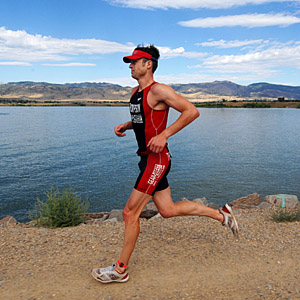
ST: Do you have a good enough half marathon run when you are healthy to gain a World Championship podium?
David: My best open half marathon run is 1:11. In a half Ironman, so far my best is 1:15.
ST: Do you see as further breakthrough in the run? Is 1:15 all there is?
David: I can lose some weight (Thompson is 6-1, 165 pounds). I am getting older and I can have better endurance. I think I can do it but train to get better.
ST: Do you have any encouraging benchmarks?
David:Every year I do a half marathon in Minnesota. When I started that, my PR was 1:15. Then I ran 1:14, then 1:13, and last year I ran 1:11.
ST: Does that give you confidence you can do something better at Clearwater?
David:Kind of. Before I was injured, I thought if I could run an open 1:11 half marathon I could possibly run 1:13 or 1:14 in a half Ironman and I had a chance to win or podium. . But then I saw Raelert run a 1:10. Now I face a decision. If I bike super hard, I normally cannot run 1:11. So, do I want to sit in the group that is riding legal, 10 meters apart, but still offers a draft for the last guy in line, and then try to run the fastest run? Or do I play to my strength and get a big enough lead so that a 1:13 or 1:14 might be able to win?
ST: What’s your choice?
David:If I am biking well, I’ll ride fast as I can and let them chase me down. If I do not have the strength to get away, then I’ll sit in the group and try and then run as fast as I can.
ST: How do you envision your best race in Clearwater developing?
David:I will take another shot at Clearwater, although it is not the best course for me. It’s kind of a pack race that comes down to the fastest run. I think if I am to get away I will have to ride sub 2 hours, and the group will ride 2:02 to 2:04. I think I am capable of doing that. But then I need to be in good shape to both ride that fast and still have enough energy left over to run at least 1:15. If I run 1:15 or 1:14, I’ll have to have a 2 to 3 minute lead off the bike because someone like Andreas Raelert will run 1:11 to 1:10.
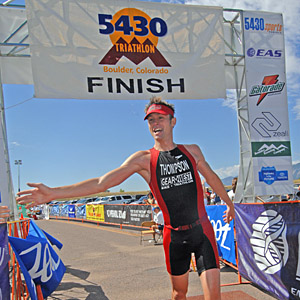
ST: Back in 2007, your dominant wins at the three-quarters of an Ironman distance races at Tri 101 must have given you Ironman ambitions. Has your injury pushed thoughts of Ironman back into the netherworld for this year?
David: If everything goes well this year, maybe I’ll think about Ironman Arizona later in the fall as a possibility. I do not think this will be the right way to go in the Northern Hemisphere training will not be optimum and because of my injury I am not counting ion it.
ST: Do you look forward to Kona?
David: Actually I went to Kona and rode the bike course for fun and also rode up to Mauna Kea with my wife Hannah. We didn’t go to 13,700 feet. We stopped at the Visitors Center. I rode road bikes with 28C wheels and Hannah had a road bike too. She really did well.
ST: I heard you thought you could catch your wife Hannah before she finished the sprint race that is run on the same day at Powerman Alabama in 2008. But you came up short by 12 minutes. So when you got home last year, did you cook dinner for a week?
David:After Powerman Alabama last year, I did more dishes.
ST: Did you get frustrated and impatient during your injury and rehab? Were you brushing up your nuclear engineering resume?
David:I was not too frustrated. I knew my knee was bad and things need to be done. But it crossed my mind that if after knee surgery things stayed bad, did I know what job I would want to do? CHUCKLES Actually I thought I might possibly work in the financial industry. But now with the markets imploding, this probably won’t be a good time to play with the financial industry.



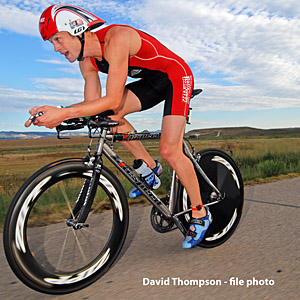

Start the discussion at forum.slowtwitch.com